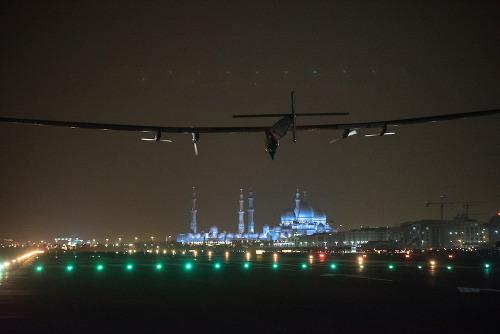A total of 19 world records were set or are still pending by the World Air Sports Federation (FAI), including Borschberg flying for five consecutive days and nights over the Pacific Ocean from Japan to Hawaii in the longest duration a solo airplane of any kind has ever flown and when Piccard achieved the first crossing of the Atlantic Ocean in a solar airplane.
For the two Swiss pioneers, it’s the accomplishment of a dream that was considered impossible by many and the demonstration that renewable energies and efficient technologies offer tangible solutions for sustainability.
“This is not only a first in the history of aviation; it’s a first in the history of energy. I’m sure that within 10 years we’ll see electric airplanes transporting 50 passengers on short to medium haul flights,” said Piccard. “The same clean technologies used on Solar Impulse could be implemented on the ground in our daily life to reduce CO2 emissions in a profitable way.”
“Flying one leg with a completely new type of airplane is difficult enough, but flying around the world is a real challenge. More than a demonstration, it’s the confirmation that these technologies are truly dependable and reliable,” emphasised Borschberg. “While 100% solar powered airplanes might take longer to materialise, electric airplanes will develop in the near future because of their tremendous advantages such as energy efficiency.”
Looking forward, Piccard and Borschberg will continue to promote the use of modern clean technologies as a way to improve the quality of life on Earth. Firstly, through the creation of the International Committee for Clean Technologies that will build on the #futureisclean initiative and regroup the main global actors in the field of clean technologies to bring independent and credible guidance on energy policy to governments and corporations alike.
Piccard said: “There is still a lot to be done to encourage a worldwide implementation of clean technologies and to motivate everyone to reduce their dependence on fossil fuels in their daily lives, hence the creation of the International Committee for Clean Technologies.”
Secondly, they will carry on the work initiated by the engineering team on unmanned and high endurance electric aircrafts, which could fly in high altitude for months, offering services that could provide exponential added value and complement the work being done by satellites today in a flexible and sustainable way.
“Solar Impulse is well positioned to contribute to the next generations of manned or unmanned electric aircrafts. By capitalising on the engineering skills and expertise gained over the past decade, we will continue to work to encourage concrete innovations and disruptive solutions,” concluded Borschberg.
 Bertrand Piccard lands the Si2 at Al Bateen Executive Airport, Abu Dhabi
Bertrand Piccard lands the Si2 at Al Bateen Executive Airport, Abu Dhabi











